Semaglutide Vocabulary 101:
Test Your Knowledge of Biology
Answers and Discussion on Quiz Page
Agonist
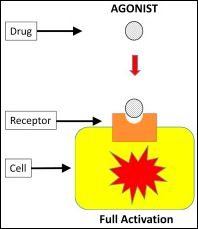
Simplistically an agonist is essentially a key that fits into the lock (switch on or in a cell) that activates a biologic process.
Quiz: Name Five Organs with Semaglutide Receptors.
Antagonist
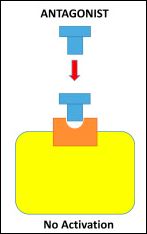
Simplistically something that blocks the agonist (key) from fitting into the receptor (lock) and does not allow the receptor to turn on a biologic process.
Quiz: Name a drug that is an Opioid receptor blocker.
BMI

Body Mass Index (BMI) is a person’s weight in kilograms (or pounds) divided by the square of height in meters (or feet).
BMI is a helpful but imperfect measure of “normal” or ideal body weight.
And multiplying by a conversion factor of 703.
Quiz: What is the BMI for a male 5’10” and weights 280 pounds ? (28/36/40/44)
Compounding
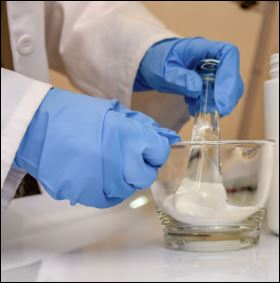
Drug compounding is a process of combining, mixing, or altering ingredients to create a medication tailored to the needs of an individual patient. Pharmacists historically were trained in the art of compounding.
States are primarily responsible for day-to-day oversight over the vast majority of the thousands of compounders in the United States, most of which do not register with FDA.
Serious infections outbreaks, such as fungal infections, have been reported. It is strongly advised to avoid non FDA approved semaglutide compounds.
Quiz: Can FDA licensed Pharmacists compound and sell tirzepatide ? (True/False)
Gastric Retention
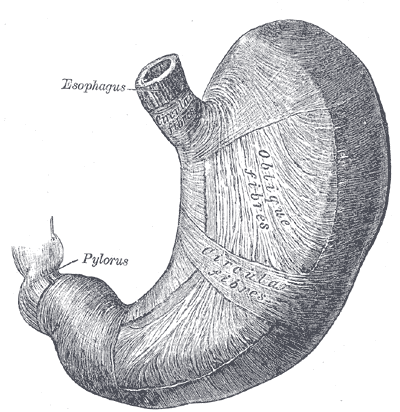
Delayed drainage of stomach contents (usually food). Semaglutide medications slow gastric motility resulting in prolonged retention of a meal. Recent reports by anesthesiologists suggest patients pre op who have fasted for 24 hours may still retain significant undigested food resulting in a fear of aspiration into the windpipe and lungs during anesthesia. This is also true for recent reports of poor preps for colonoscopy requiring repeat procedures.
Quiz: If you are on semaglutide medications what is the best thing to do if you are planning for a colonoscopy ?
Gastroparesis
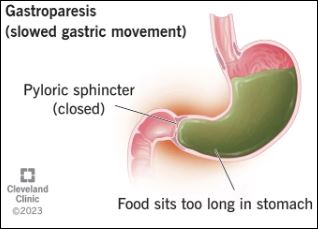
Complete or markedly decreased effective stomach muscular contractions resulting in severe gastric retention of food. Gastroparesis results in abdominal bloating, abdominal pain and potential vomiting (aspiration) of food contents into the wind pipe.
Quiz: Can my doctor prescribe a medication to avoid gastroparesis ?
GIP

GIP, also called glucose-dependent insulinotropic polypeptide, is a 42-amino-acid peptide secreted by enteroendocrine K cells located in the duodenum and proximal jejunum. A major role of GIP is to mediate the postprandial potentiation of insulin secretion.
GIP levels rise immediately after nutrient (food) ingestion, leading to modest inhibitory effects on gastric acid secretion and gastrointestinal motility.
GIP enhances postprandial glucagon response and GLP-1 suppresses it. In adipose tissues, GIP but not GLP-1 facilitates fat deposition.
Quiz: What drugs are agonists for GLP-1 and GIP receptors.
GLP-1 Meds
| Trulicity |
| Rybelsus |
| Wegovy |
| Ozempic |
| Mounjaro |
| Zepbound |
GLP-1 (glucagon-like peptide 1) is a 30-residue incretin peptide hormone secreted into the bloodstream from the gut, primarily by distal ileum enteroendocrine L-cells in response to nutrient (food) ingestion. GLP-1 regulates blood glucose levels through several mechanisms, including stimulation of glucose-dependent secretion of insulin, suppression of pancreatic glucagon release, satiety enhancement, delayed stomach emptying, and reduction of energy intake. GLP-1 is derived from the processing of proglucagon that occurs in ileal L cells . During meals, GLP-1 is secreted in two stages: a first peak occurs approximately 15 min after the beginning of the meal, when food in the stomach and in the initial portions of the intestine stimulating the release of hormones, such as glucose-dependent insulinotropic polypeptide (GIP), which acts by vagal pathways to stimulate L cells; a second peak occurs after direct stimulation of L cells by nutrients (food).
The exceedingly short half-life (1–2 min) of GLP-1 limits its therapeutic applicability to be effective in pill formulation.
Quiz: What drug is undergoing clinical studies of oral high dose to combat the short half life ?
GLP-1RA
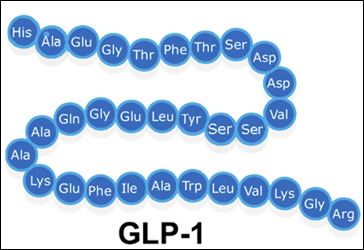
Glucagon-like peptide-1 receptor agonists stimulate receptors located in the stomach, large intestines, distal ilium, pancreas and brain.
Quiz: What are the three most serious potential complications of GLP-1RA’s ?
Glucagon

Glucagon is a 29-amino acid peptide hormone that stimulates glycogenolysis and gluconeogenesis, and thus acts in opposition to the glucose-lowering effects of insulin.
Glucagon protein receptors are involved in glucose homeostasis.
The proglucagon gene (gcg) encodes a number of peptide hormones that are of cell-type specifically expressed in the pancreatic islets, the distal ileum and the large intestine, as well as certain brain neuronal cells. These hormones are important in controlling blood glucose homeostasis, intestinal cell proliferation, and satiety.
Quiz: What serious acute complication of diabetics on insulin does a shot of glucagon cure?
Incretin
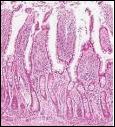
Incretin hormones are gut peptides that are secreted after nutrient intake and stimulate insulin secretion together with hyperglycemia. GIP (glucose-dependent insulinotropic polypeptide) und GLP-1 (glucagon-like peptide-1) are the known incretin hormones from the upper (GIP, K cells) and lower (GLP-1, L cells) gut.
Quiz: What are the two drugs that are FDA approved that contain two incretins ?
Ileus
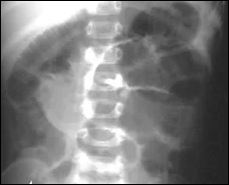
Ileus is the absence of the normal muscle contractions (ineffective or loss of peristalsis) of the intestines. Individuals with ileus will feel bloated with abdominal pain, nausea and vomiting of gastric and intestinal contents.
Quiz: How many times higher is the risk of bowel obstruction in the JAMA 11/15 2023 study compared to buproprion-naltrexone ? (2, 5, 7, 9)
Insulin
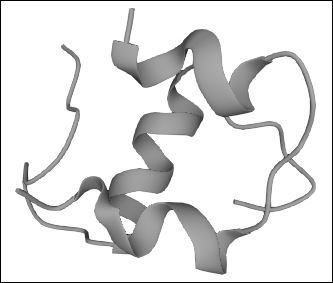
A hormone produced in the pancreas by the islets of Langerhans, which regulates the amount of glucose in the blood. The lack of insulin causes a form of diabetes. Human insulin consists of 51 amino acids, divided into two chains, commonly labelled A and B, with 21 and 30 amino acids respectively.
Quiz: What is the risk of taking insulin with semaglutide meds ?
Pancreatitis

Inflammation of the pancreas. Symptoms usually include nausea, vomiting, fever, abdominal and back pain. Pancreatitis may be acute or chronic, mild or severe.
Causes of pancreatitis include: elevated triglycerides, alcohol, gallstones, some medications. Due to the relatively low (but not zero) incidence of semaglutide pancreatitis it has been difficult to specifically quantitate or identify specific individuals at risk. Documented hospital admissions for presumed semaglutide pancreatitis have been documented.
Quiz: How many time higher is the risk of pancreatitis in the JAMA 11/15 2023 study compared to buproprion-naltrexone ?

